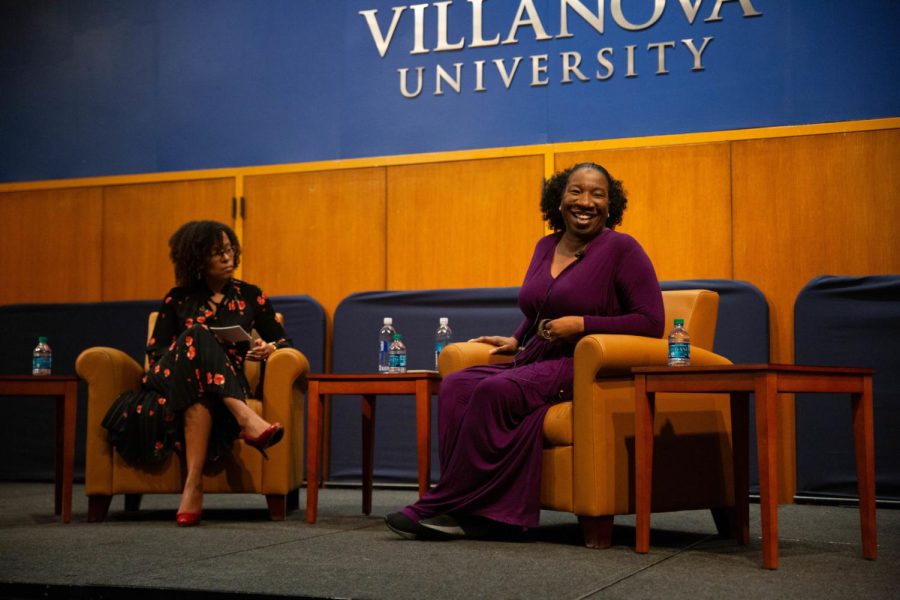Tarana Burke Brings ‘me too’ Movement to Villanova
March 26, 2019
The Connelly Center was at standing-room only with masses of students, faculty and members of the community packed like sardines into the Villanova Room this past Monday night, all to hear a few words from Tarana Burke.
The civil rights activist and sexual abuse survivor addressed not only the audience crowded inside the Villanova Room, but also the classrooms throughout campus which were live-streaming the event. The Bronx native felt right at home in Philadelphia and recounted her time working for various nonprofits in the city several years ago. Although Philadelphia played a prominent role in Burke’s career and lasting legacy, her story has taken place over a number of places and touched hearts worldwide.
The founder of the “Me Too” movement was born and raised in The Bronx, New York and was a victim of sexual abuse and rape throughout her childhood and adolescence. Burke does not elaborate or give any details about her suffering, nor does she want to talk about it. Burke makes it extremely clear that she is more than just a victim. She laughs and she jokes all the time. “I’m a human being,” she said on Monday. Her past influenced her decision to become involved and actively work to help support and aid the recovery of victims of sexual abuse and assault.
Burke attended Auburn University in Alabama, where she quickly became a leader within the community. She organized protests and discussions regarding issues of economic and racial injustice. After graduating, Burke founded the nonprofit “Just Be” in 2003, which is a program dedicated for black girls in the community ages 12 to 18. Prior to this, Burke also worked within a myriad of civil rights organizations. Her work within the realm of civil rights even led her to become a consultant for the 2014 film Selma, which is based on the 1965 voting rights marches.
While still living in Alabama, Burke founded the “Me Too” movement in 2006. Her goal was to provide victims of sexual assault and abuse with a “space and sense of community that they didn’t have before.” The keywords Burke noted, which go along with the “Me Too” movement, are empowerment and empathy. Burke believes that “everyone has experienced trauma” in some way but the pain of sexual assault is specific, just how the loss of a loved one is specific or another type of traumatic experience may be. Burke’s goal is to create a connection between people who have lived through their trauma. Burke, herself, has been touched emotionally and felt “a forever connection” with some of the victims that she has met and with whom she has exchanged stories.
In 2017, after Burke’s time working for nonprofits in Philadelphia, back in The Bronx, Burke was alerted by a friend that “Me Too” was going viral online. In a response to the latest emergence of Hollywood celebrities coming forward about their experiences dealing with sexual abuse and assault, actress Alyssa Milano sent out a Tweet asking for victims worldwide to hashtag Burke’s phrase to emphasize the magnitude of this issue and see how many lives sexual assault has affected. Since 2017, Burke’s world has been completely changed and forced her to become a presence in the media’s spotlight.
Burke has since been a guest for Red Carpet events, invited to speak around the world and was named – with a group of several other women – Time’s 2017 Person of the Year. In light of the past two years’ whirlwind, Burke urged the audience in the Villanova Room to remember that these celebrities and even herself are still just survivors looking to recover.
“We all understand pain. We all understand grief. We all understand trauma,” Burke said. It is the job of both the survivors and allies to “give those people a moment,” a moment which is transforming into a powerful, worldwide movement.
Burke’s words transfixed the audience as the allotted time went over schedule and audience members stayed glued to their seats. No one wanted to miss a word, a joke, a laugh, a sigh or even a pause of Burke’s. Her own moving story and those stories she shared of others’ brought the audience to gasps of laughter and sadness for almost two hours in one of the most attended guest lectures seen at the University.
Burke’s closing words were to remind the audience that “surviving can look like anything.” In a nation where unrest and uncertainty seems omnipotent, it is empathy and empowerment that will connect us all to one another and truly create a global movement.











